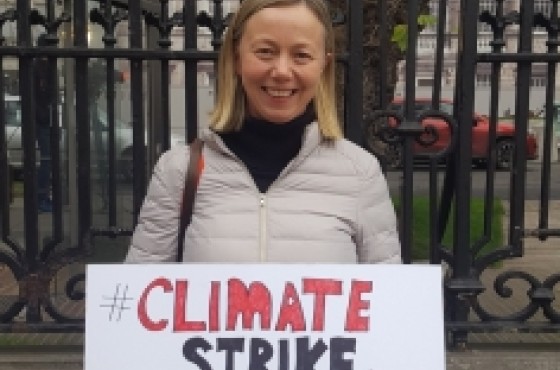"Accept the gravity of climate change"

by Dr Lorna Gold
01 Apr 2019
This is the first in a series of blogs that will be published in the lead up to the Dóchas Conference 2019 – Finding Our Voice: How Civil Society is Countering Uncertainty – on 2 May 2019 in the Radisson Blu Royal Hotel, Golden Lane, Dublin 8.
We are asking leaders, innovators and thinkers working in the areas of equality, justice and development to respond to a set of questions around the theme of the conference - the key challenges facing international cooperation and how we can shape the Irish response to these challenges, find opportunities within them, and build public support along the way.
Today, we are delighted to feature Dr Lorna Gold, academic, climate campaigner, author and Project Coordinator, Laudato Sí, at Trócaire.
What do you see as the main challenge facing international cooperation between now and 2030?
According to the Intergovernmental Panel on Climate Change, if there is to be any chance of avoiding runaway climate change by the end of this century, the world must reach peak climate emissions in the next two years and be well on the road to decarbonising by 2030. Vested political and financial interests, as well as cultural factors and educational blind spots, have conspired to mean that the measures now essential to shift our planet onto a sustainable path are still a distant pipedream. Responding to this requires nothing less than an economic and social transformation on a scale and at a pace never seen before. It means that as climate change begins to bite in earnest, the coming decade is going to entail political upheaval and significant struggles. As this unfolds, many international NGOs risk being ‘pidgeon-holed’ as the ones who pick up the pieces of a world ravaged by more droughts, chronic hunger and storms. To remain relevant in the coming decade, international cooperation must challenge this narrative and become key drivers of a just transformation.
What role can civil society, particularly in Ireland, play in overcoming this challenge, and how will civil society need to change to achieve this?
For civil society in Ireland, there is a need not only to accept the gravity of climate change, but the fact that this now needs to be owned by everyone in the sector. A mind-set change is needed. At present one or two NGOs focus on climate justice, but the majority remain relatively silent for various reasons. Greater leadership is now needed by many voices in speaking up and calling out the injustice of Irish policies that contribute to climate change. Ireland’s emissions remain stubbornly high and major NGOs represent a significant political force, especially when they work together to put pressure on politicians and society at large to accept the responsibility to change. Education and advocacy are key to this, but so too is the example NGOs set in getting their house in order. One key step that all NGOs could take immediately is to commit to divesting their investments, pensions and banking from fossil fuels as a key signal that they are engaged and leading the shift to a just low carbon future.
How do we bring the Irish public along with us to believe in and champion the importance of international cooperation?
The Irish public are quick to spot authentic leadership and to follow. Young people, in particular, have been demonstrating this in recent months through their #FridaysforFuture climate strikes which have quickly grown into a nationwide movement. They have shown that leadership doesn’t always involve doing more – but sometimes it involves doing less. It involves the courage to disrupt the status quo. Perhaps the most important thing for NGOs just now is to take issue with the unbearable burden of constantly picking up the pieces of climate change, particularly when Ireland’s emissions are rising and thus contributing to climate breakdown. If Irish NGO workers were to get behind the weekly Friday climate strikes in solidarity with the millions suffering as a result of climate injustice and demand the Irish government lowers its emissions - now that would be transformative leadership.
The opinions expressed in this blog are the author's own and do not necessarily reflect the views of Dóchas.
The Dóchas Conference 2019 - Finding Our Voice: How Civil Society is Countering Uncertainty - will take place on 2 May 2019, 2pm - 5.30pm, in the Radisson Blu Royal Hotel, Golden Lane, Dublin 8. Registration from 1.30pm - 2pm. The Conference will explore the key challenges facing international cooperation between now and 2030. It will provide a space for discussion and new ideas about how we can shape the Irish response to these challenges, find opportunities within them, and build public support along the way. Speakers include Winnie Byanyima, Executive Director of Oxfam International, and Anne-Birgitte Albrectsen, Chief Executive Officer, Plan International, and more.